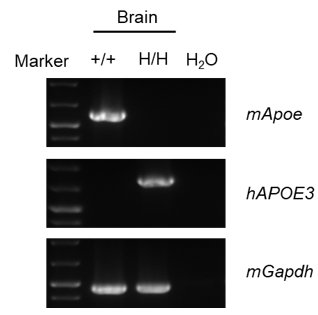B-hAPOE3 mice
| Strain Name |
C57BL/6JNifdc-Apoetm1(APOE*3)Bcgen/Bcgen
|
Common Name | B-hAPOE3 mice |
| Background | C57BL/6JNifdc | Catalog number |
112561 |
|
Aliases |
Apo-E | ||
- APOE is a major apoprotein of the chylomicron, which is essential for the normal catabolism of triglyceride-rich lipoprotein constituents by binding to a specific liver and peripheral cell receptor
- The exons 2~4 of mouse Apoe gene that encode the full-length protein were replaced by human APOE3 exons 2~4 in B-hAPOE3 mice
- hAPOE3 protein was detected in serum and whole brain homogenates of homozygous B-hAPOE3 mice
- Application: This product is used as the metabolic disease models associated with APOE3 or as a control for pharmacodynamics and safety evaluation of Alzheimer's disease drugs in B-hAPOE4 mice.
mRNA expression analysis

Strain specific analysis of APOE mRNA expression in wild-type C57BL/6J mice and B-hAPOE3 mice by RT-PCR. Brain RNA were isolated from wild-type C57BL/6J mice (+/+) and homozygous B-hAPOE3 mice (H/H), then cDNA libraries were synthesized by reverse transcription, followed by PCR with mouse or human APOE primers. Mouse Apoe mRNA was detectable only in wild-type C57BL/6 mice. Human APOE mRNA was detectable only in homozygous B-hAPOE3 mice but not in wild-type mice.

Strain specific APOE expression analysis in homozygous B-hAPOE3 mice by ELISA. Serum collected from wild-type C57BL/6J mice (+/+) and homozygous B-hAPOE3 mice (H/H) were analyzed by ELISA with species-specific APOE ELISA kit. Mouse APOE was detectable in wild-type mice. Human APOE was exclusively detectable in homozygous B-hAPOE3 mice but not in wild-type mice.

Strain specific APOE expression analysis in homozygous B-hAPOE3 mice by ELISA. Whole brain lysate collected from wild-type C57BL/6J mice (+/+) and homozygous B-hAPOE3 mice (H/H). APOE was measured in the brain homogenates using species-specific APOE ELISA kit and then normalized to total protein levels. Mouse APOE was detectable in wild-type mice. Human APOE was exclusively detectable in homozygous B-hAPOE3 mice but not in wild-type mice.









